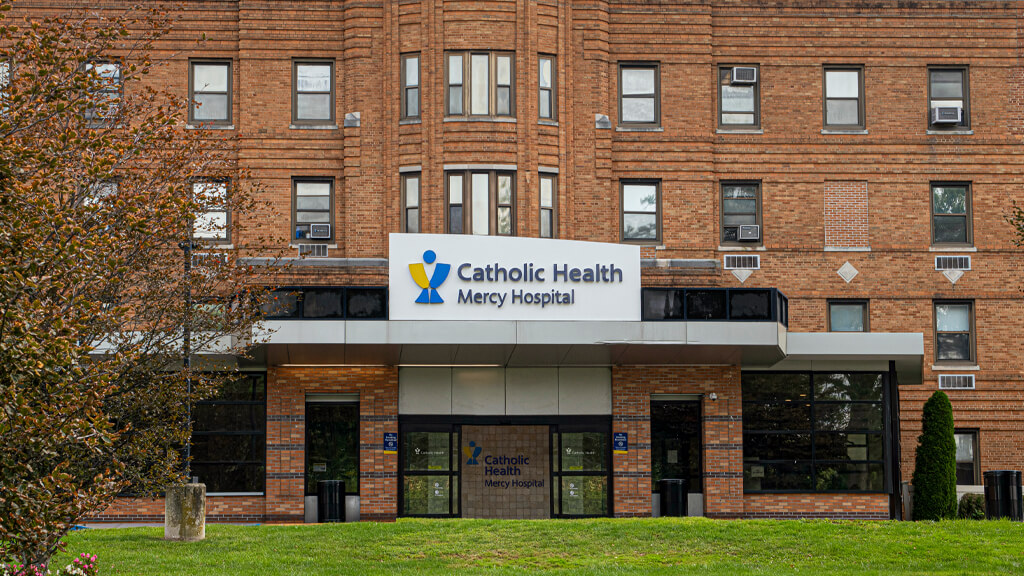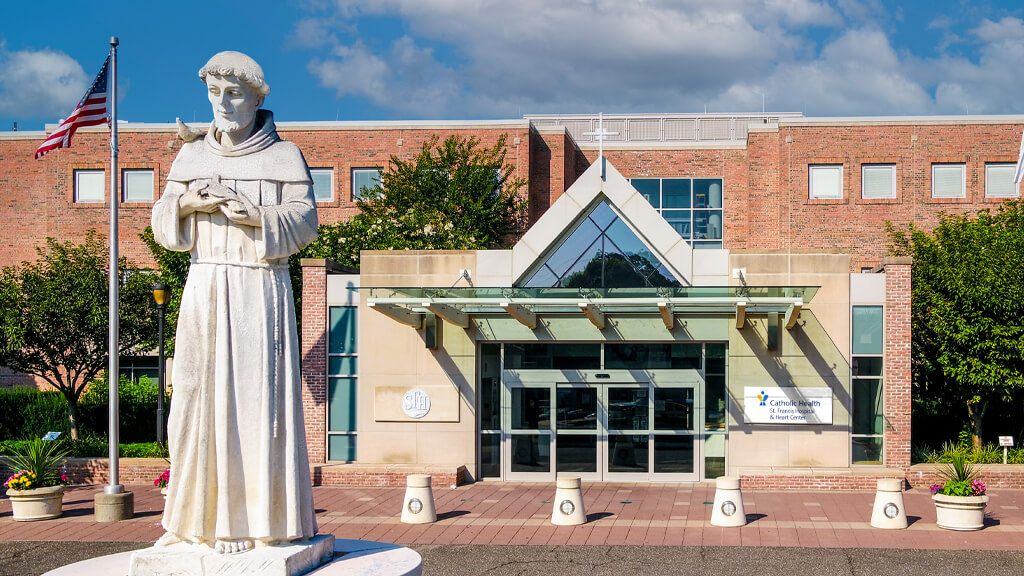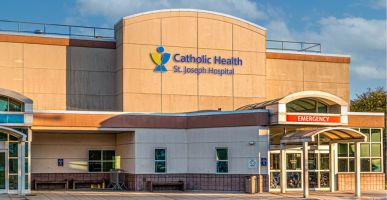Weight Loss that Works for You
Weight loss journeys can be long, full of ups-and-downs, and often frustrating. At Catholic Health, our bariatric experts offer both non-surgical and surgical treatment options. We will help you find an approach that fits your goals and lifestyle — and we’ll be here to support your long-term weight management success.
The good news is that you don’t have to travel far to find expert weight loss care. We offer innovative treatments at our locations across Nassau and Suffolk County.
Bariatric Surgery
Catholic Health offers acclaimed weight loss programs with a team of hospitals accredited as Comprehensive Bariatric Surgery Centers. Our surgeons are fellowship-trained in minimally invasive techniques and robotic surgery to deliver safe, effective weight loss outcomes.
Bariatric surgery works by altering your digestive system. It reduces the size of your stomach to help you feel full faster and eat less. In some procedures, it lowers levels of the hunger hormone (ghrelin) and may reduce the calories your body absorbs from food.
Bariatric surgery is one of the safest surgery options. It can be performed using laparoscopic techniques that use small incisions and allow for a fast recovery.
Do I Qualify for Weight Loss Surgery?
While every patient is unique, the following general criteria should be met in order to qualify for weight loss surgery:
- A BMI of 40 or above
- A BMI of 35 or above with a medical issue linked to obesity, like diabetes, high blood pressure, high cholesterol or sleep apnea
Body mass index (BMI) is a calculation that estimates your body fat percentage based on your height and weight. It helps your provider know whether your weight is a health issue you need to address.
Weight Loss Surgery Options
Catholic Health offers a full spectrum of minimally invasive weight loss surgery options. If you qualify, your bariatric weight loss specialist will work closely with you to determine which treatment will work best for you.
Meet the Team

Pratibha Vemulapalli, MD, FACS
Chief of Surgery at Good Samaritan University Hospital. General and Bariatric Surgery

Bariatric Procedures
During endoscopic sleeve gastroplasty (ESG), your surgeon uses a flexible tool (endoscope) to place sutures in the stomach. They stitch the stomach tissue into folds and shape it into a tube or sleeve. The stomach heals around the sutures to form a new shape. As a result, your stomach has less room to hold food, making you feel full faster and eat less. ESG doesn’t involve incisions, so you won’t have any scars. You’ll have a quicker recovery and lower risk of complications.
A sleeve gastrectomy is a restrictive procedure that reduces the amount of food you can eat. Your surgeon will remove up to 85% of your stomach, including the part that produces ghrelin, the hunger hormone. They will use the rest of the stomach to form a tube with a pouch that holds a small amount of food. This helps you eat less while still feeling satisfied.
Roux-en-Y gastric bypass is one of the most common bariatric surgery options. Your surgeon creates a small pouch with your stomach, about the size of your thumb. Then, they reroute your small intestine to connect one end with the newly created pouch.
The surgery reduces your stomach size and your hunger hormone levels. It also limits the fat, calories and nutrients your body absorbs, which affects your insulin secretion and decreases your bad cholesterol (LDL) levels.
Laparoscopic adjustable gastric band surgery is a restrictive procedure that reduces stomach size. Your surgeon places an adjustable, hollow silicone band around your stomach near its upper end. The band creates a small pouch and a narrow passageway into the rest of your stomach. This makes you feel satisfied after eating smaller amounts of food.
In single-incision laparoscopic surgery (SILS), your physician makes one small incision in your belly button. They’ll use this opening to access your abdomen and perform the same procedure used in traditional laparoscopic bariatric surgeries, like sleeve gastrectomy and gastric bypass.
The duodenal switch is a good surgery option if you have a high BMI and other health issues, like diabetes. It’s also effective if you have gained weight since a previous weight loss surgery. However, this surgery is not reversible.
The duodenal switch has two parts — restrictive and malabsorptive — that work together to help you lose weight. During the restrictive component, your surgeon performs a sleeve gastrectomy. This procedure restricts the amount of food you can eat, reduces your hunger hormone levels and helps control your blood sugar.
In the malabsorptive step, your surgeon reroutes your small intestine and connects the end just off your stomach. As a result, you’ll absorb less calories, fat and nutrients from the food you eat. The duodenal switch also helps control your insulin production and decreases your bad cholesterol (LDL) levels.
If you had a previous gastric bypass or sleeve gastrectomy but regained the weight you lost, an endoscopic revision may help. During the procedure, your surgeon inserts an endoscope through your mouth and into your abdomen. They use the tool to fix any issues and reduce the size of your stomach pouch or opening.
When you have a high BMI, your abdominal wall thickens, which can make traditional laparoscopic surgery difficult. The da Vinci robot surgical system can increase your surgery options.
The robotic arms allow your surgeon to operate in small spaces and navigate thicker abdominal walls. A 3D camera provides a better view while working around sensitive tissues. Your surgeon will have better control over precise movements and an increased range of motion.
Revisional surgery is an option if you had a previous unsuccessful weight loss surgery. However, revisional procedures carry a higher complication risk. Your provider will help determine if this option is right for you.
Adolescents looking to lose and manage weight may be eligible for laparoscopic sleeve gastrectomy. Parents play a key, supportive role in the treatment process. Together, we will discuss nutritional needs, exercise guidance and mental health support to help your child succeed long-term.
Frequently Asked Questions
After surgery, your team of surgeons, nutritionists and psychologists will check in with you regularly. You’ll need to stick to soft foods for the first six weeks before switching to a regular diet. You can return to work about a week after the procedure. Avoid heavy lifting for four to six weeks.
It’s important to remember that surgery and medication are weight loss tools — not replacements for lifestyle changes. You’ll need to implement new habits to get the most successful weight loss results. We’ll help you:
- Follow a calorie-reduced, healthy eating plan
- Partake in regular exercise tailored to your abilities
- Find counseling, support groups and other programs to address mental health concerns
We recommend checking with your insurance provider to find out the details of your plan’s coverage. You may be able to use a flexible spending account (FSA) to save on medical weight loss costs.
Weight Loss and Bariatric Surgery Seminars
Struggling with weight loss?
Curious in GLP-1 agonist medications
and how they can help with weight loss?
Are you interested in bariatric surgery?
Have you had bariatric surgery?
Attend our weekly informational seminars. Engage with our expert physicians and receive valuable insights from professionals who truly understand your needs. Learn about your non-surgical and surgical options available through Catholic Health. Seminars occur every Tuesday at 6 pm.

Related Services
Our bariatrics program isn’t just about losing weight. It’s about taking care of your whole self. At Catholic Health, you’ll have access to a team of providers focused on your well-being. They work across specialties, including:
St. Francis Heart Center Weight Loss Program
St. Francis Heart Center offers a 3-month program designed to give you the tools and support you need for successful weight loss. This comprehensive weight loss program includes an initial consultation with an InBody scan to assess your current health and body composition. A customized diet plan is then created and tailored to your individual needs. The program also includes:
- Monthly follow-up appointments to monitor your progress, make adjustments, and offer ongoing support
- Optional weekly check-Ins: by phone, email, or in-person
- Weekly education classes on zoom
- Additional InBody scan at the last follow-up session to measure progress
Informative classes on nutrition, fitness, and lifestyle strategies are offered on Tuesdays and Thursdays to support your journey.
Call 516-563-7940 to make an appointment.
St. Francis Heart Center Weight Loss Program located at:
The DeMatteis Center
101 Northern Blvd
Greenvale, NY 11548
B-Healthy Exercise Program
The B-Healthy Exercise Program is a comprehensive outpatient rehabilitation program that features medically supervised physical therapy for endurance training, strength training, and education for patients following bariatric surgery.
- Patients will have a comprehensive physical therapy evaluation, including an assessment of strength, flexibility, endurance, and function.
- Treatment will include endurance training, upper and lower body strength training, and patient education including home exercise instruction.
A physician prescription for physical therapy is required for this program.
Call the location of your choice to make an appointment. This program is available at the following locations:
St. Charles Rehabilitation
240 Middle Country Road
Smithtown, NY 11787
(631) 382-4550
St. Charles Rehabilitation
Hospital Main Campus
200 Belle Terre Road
Port Jefferson, NY 11777
(631) 474-6111
St. Charles Rehabilitation
1895 Walt Whitman Road
Melville, NY 11747
(631) 577-3400
St. Charles Rehabilitation
501A Montauk Highway
West Babylon, NY 11704
(631) 465-715
Commack Rehabilitation Network
500 Commack Road, Suite 150A
Commack, NY 11725
(631) 784-1960
Ronkonkoma Rehabilitation Network
3279 Veterans Highway
Ronkonkoma, NY 11779
(631) 580-8720
St. Charles Rehabilitation
761B Merrick Avenue
Westbury, NY 11590
(516) 421-4270
Bariatric & Weight Loss Surgery Locations

Good Samaritan University Hospital
West Islip, NY

Mercy Hospital
Rockville Centre, NY

St. Charles Hospital
Port Jefferson, NY

St. Catherine of Siena Hospital
Smithtown, NY

St. Francis Hospital & Heart Center
Roslyn, NY

St. Joseph Hospital
Bethpage, NY

